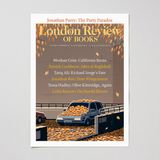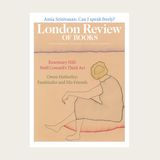RECENT ARTICLES

Patrick Cockburn · Thriving on Chaos: After al-Baghdadi · LRB 19 November 2019
More search OptionsBrowse by Subject first act in the war on Iraq was an attempt to kill Saddam Hussein. In the early hours of the morning of 20 March 2003, forty cruise missiles were launched and bunker-buster bombs dropped on a compound on the outskirts of Baghdad where US intelligence wrongly believed him to be staying. Three years later a US airstrike succeeded in killing Abu Musab al-Zarqawi, the founder of al-Qaida in Iraq, the organisation that would become Islamic State. Neither Saddam’s survival nor al-Zarqawi’s death had much impact on the course of events, but the White House...…More search OptionsBrowse by Subject first act in the war on Iraq was an attempt to kill Saddam Hussein. In the early hours of the morning of 20 March 2003, forty cruise missiles were launched and bunker-buster bombs dropped on a compound on the outskirts of Baghdad where US intelligence wrongly believed him to be staying. Three years later a US airstrike succeeded in killing Abu Musab al-Zarqawi, the founder of al-Qaida in Iraq, the organisation that would become Islamic State. Neither Saddam’s survival nor al-Zarqawi’s death had much impact on the course of events, but the White House...WW…

Matt Foot · Diary: Children of the Spied-On
Theresa May, who was then home secretary, announced that there would be an inquiry into undercover policing and the operation of the Metropolitan Police’s Special Demonstration Squad (SDS). This secret unit, whose purpose was to infiltrate subversive groups, was set up in 1968 as part of Special Branch in response to protests against the Vietnam War. Only a handful of politicians, civil servants and senior police officers knew that the SDS existed; for 43 years, Parliament was told nothing. In 2010 an SDS officer, who under the alias Mark Stone had infiltrated the climate change movement,...…Theresa May, who was then home secretary, announced that there would be an inquiry into undercover policing and the operation of the Metropolitan Police’s Special Demonstration Squad (SDS). This secret unit, whose purpose was to infiltrate subversive groups, was set up in 1968 as part of Special Branch in response to protests against the Vietnam War. Only a handful of politicians, civil servants and senior police officers knew that the SDS existed; for 43 years, Parliament was told nothing. In 2010 an SDS officer, who under the alias Mark Stone had infiltrated the climate change movement,...WW…

Amia Srinivasan · He, She, One, They, Ho, Hus, Hum, Ita: How Should I Refer to You? · LRB 2 July 2020
More search OptionsBrowse by Subject the wrong pronouns used for me – ‘he/him’ instead of ‘she/her’ – by two people, as far as I know. One of them was an editor at this paper, who I am told used to refer to me as ‘he’ when my pieces passed through the office. In his mind only men were philosophers. The other was Judith Butler. I had written a commentary on one of her books, and she wrote a reply to be published along with it. In the draft of her response, she referred to me by my surname and, once, as ‘he’. Just a few lines later she wrote: ‘It is surely important to refer to others in...…More search OptionsBrowse by Subject the wrong pronouns used for me – ‘he/him’ instead of ‘she/her’ – by two people, as far as I know. One of them was an editor at this paper, who I am told used to refer to me as ‘he’ when my pieces passed through the office. In his mind only men were philosophers. The other was Judith Butler. I had written a commentary on one of her books, and she wrote a reply to be published along with it. In the draft of her response, she referred to me by my surname and, once, as ‘he’. Just a few lines later she wrote: ‘It is surely important to refer to others in...WW…

Owen Hatherley · Wild and Tattered Kingdom: Fassbinder and His Friends
When asked in 1974, halfway through his too-brief career, whether he thought films ought to be critical rather than affirmative, Rainer Werner Fassbinder replied that ‘the best thing’ he could imagine ‘would be to create a union between something as beautiful and powerful and wonderful as the Hollywood film and a criticism of the status quo. That’s my dream, to create such a German film – beautiful and extravagant and fantastic, and nevertheless go against the grain.’ Ian Penman’s Fassbinder Thousands of Mirrors is in large part a book about dreams, and about interrupting them. Fassbinder...…When asked in 1974, halfway through his too-brief career, whether he thought films ought to be critical rather than affirmative, Rainer Werner Fassbinder replied that ‘the best thing’ he could imagine ‘would be to create a union between something as beautiful and powerful and wonderful as the Hollywood film and a criticism of the status quo. That’s my dream, to create such a German film – beautiful and extravagant and fantastic, and nevertheless go against the grain.’ Ian Penman’s Fassbinder Thousands of Mirrors is in large part a book about dreams, and about interrupting them. Fassbinder...WW…

Adam Mars-Jones · Ekphrasis is so dead: ‘The Late Americans’
The campus novel is a sub-genre with an inbuilt tendency towards navel-gazing since literary fiction is by and large written by graduates for graduates. Setting this one in Iowa City, home of the Writers’ Workshop, risks an inflammation of this tendency. Sensibly, Brandon Taylor pulls away from roman à clef territory and a hall-of-mirrors effect by ignoring practitioners of fiction and introducing a poet, Seamus, in the first section of The Late Americans.Seamus is a disruptive element in his seminar group, prone to giggles as he mentally critiques the work being examined (‘This variety of...…The campus novel is a sub-genre with an inbuilt tendency towards navel-gazing since literary fiction is by and large written by graduates for graduates. Setting this one in Iowa City, home of the Writers’ Workshop, risks an inflammation of this tendency. Sensibly, Brandon Taylor pulls away from roman à clef territory and a hall-of-mirrors effect by ignoring practitioners of fiction and introducing a poet, Seamus, in the first section of The Late Americans.Seamus is a disruptive element in his seminar group, prone to giggles as he mentally critiques the work being examined (‘This variety of...WW…

Tom Stammers · We demand cloisters! Artists’ Studios
On 20 December 1857, Eugène Delacroix recorded his thoughts on seeing his studio on rue Notre-Dame de Lorette being dismantled. ‘My ambition is bounded by these walls,’ he wrote in his journal. ‘I enjoy the last moments available to me to feel myself still in this place which has seen me for so many years and in which was spent the great part of the latter period of my youth.’ He had spent thirteen years there. Delacroix ‘loved only his studio’, Maxime du Camp said, ‘and it was there he preferred to live.’ Delacroix once described it as a ‘crucible’, in which base substances underwent...…On 20 December 1857, Eugène Delacroix recorded his thoughts on seeing his studio on rue Notre-Dame de Lorette being dismantled. ‘My ambition is bounded by these walls,’ he wrote in his journal. ‘I enjoy the last moments available to me to feel myself still in this place which has seen me for so many years and in which was spent the great part of the latter period of my youth.’ He had spent thirteen years there. Delacroix ‘loved only his studio’, Maxime du Camp said, ‘and it was there he preferred to live.’ Delacroix once described it as a ‘crucible’, in which base substances underwent...WW…

James Meek · The Health Transformation Army: What can the WHO do? · LRB 2 July 2020
More search OptionsBrowse by Subject big leader to livestream a message to the virtual World Health Assembly on 18 May was supposed to be Cyril Ramaphosa, president of South Africa and chairman of the African Union, but something went wrong with the feed. Xi Jinping went first instead. We saw the president of China seated behind a highly polished table, in front of a mural showing rosy dawn creeping over the Great Wall. He promised billions of dollars to fight Covid-19 and invoked ‘planet Earth, our common home’. When the virus appeared in China, he said, his country had acted with...…More search OptionsBrowse by Subject big leader to livestream a message to the virtual World Health Assembly on 18 May was supposed to be Cyril Ramaphosa, president of South Africa and chairman of the African Union, but something went wrong with the feed. Xi Jinping went first instead. We saw the president of China seated behind a highly polished table, in front of a mural showing rosy dawn creeping over the Great Wall. He promised billions of dollars to fight Covid-19 and invoked ‘planet Earth, our common home’. When the virus appeared in China, he said, his country had acted with...WW…

Eric Foner · The Corrupt Bargain: Democracy? No thanks · LRB 21 May 2020
More search OptionsBrowse by Subject Americans wake up to the fact that a president can be elected despite receiving fewer votes than another candidate. Until 2000 the electorate couldn’t be blamed for being unaware of this possibility, because it hadn’t happened since 1888. But twenty years ago George W. Bush squeaked into office with a five vote majority in the electoral college even though Al Gore outpolled him by half a million votes. Then in 2016 Hillary Clinton received nearly three million more votes than Donald Trump but still lost by a substantial margin – 304 to 227 – among the...…More search OptionsBrowse by Subject Americans wake up to the fact that a president can be elected despite receiving fewer votes than another candidate. Until 2000 the electorate couldn’t be blamed for being unaware of this possibility, because it hadn’t happened since 1888. But twenty years ago George W. Bush squeaked into office with a five vote majority in the electoral college even though Al Gore outpolled him by half a million votes. Then in 2016 Hillary Clinton received nearly three million more votes than Donald Trump but still lost by a substantial margin – 304 to 227 – among the...WW…
Blake Morrison · It’s not me who’s seeing: Jon Fosse’s Methods · LRB 5 January 2023
AcceptCloseMore search OptionsBrowse by SubjectVol. 45 No. 1 · 5 January 2023Show MoreShow MoreShow More doesn’t use sentences, or prefers not to end them. When you open Septology, with its smallish print and narrow margins, it can feel like a death sentence – all the more so since the book, much possessed with death, runs to more than eight hundred pages. There are no paragraphs or full stops here. Fosse has called the writing ‘slow prose’ and it lingers on moments – hours even – when nothing much happens, as the main character, Asle, sits gazing at the fjord beyond the window or at the...…AcceptCloseMore search OptionsBrowse by SubjectVol. 45 No. 1 · 5 January 2023Show MoreShow MoreShow More doesn’t use sentences, or prefers not to end them. When you open Septology, with its smallish print and narrow margins, it can feel like a death sentence – all the more so since the book, much possessed with death, runs to more than eight hundred pages. There are no paragraphs or full stops here. Fosse has called the writing ‘slow prose’ and it lingers on moments – hours even – when nothing much happens, as the main character, Asle, sits gazing at the fjord beyond the window or at the...WW…

Jerry Fodor · Where is my mind? · LRB 12 February 2009
More search OptionsBrowse by SubjectIf there’s anything we philosophers really hate it’s an untenable dualism. Exposing untenable dualisms is a lot of what we do for a living. It’s no small job, I assure you. They (the dualisms, not the philosophers) are insidious, and they are ubiquitous; perpetual vigilance is required. I mention only a few of the dualisms whose tenability we have, at one time or other, felt called on to question: mind v. body; fact v. value; knowledge v. true belief; induction v. deduction; sensing v. perceiving; thinking v. behaving; denotation v. connotation; thought...…More search OptionsBrowse by SubjectIf there’s anything we philosophers really hate it’s an untenable dualism. Exposing untenable dualisms is a lot of what we do for a living. It’s no small job, I assure you. They (the dualisms, not the philosophers) are insidious, and they are ubiquitous; perpetual vigilance is required. I mention only a few of the dualisms whose tenability we have, at one time or other, felt called on to question: mind v. body; fact v. value; knowledge v. true belief; induction v. deduction; sensing v. perceiving; thinking v. behaving; denotation v. connotation; thought...WW…
- Total 10 items
- 1